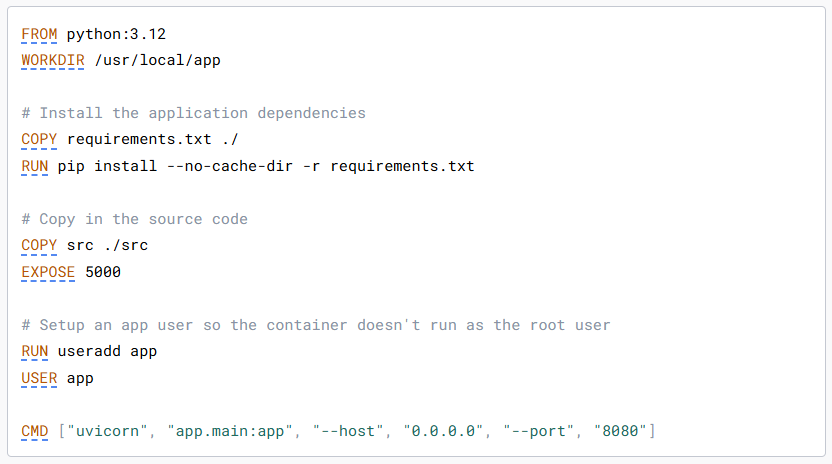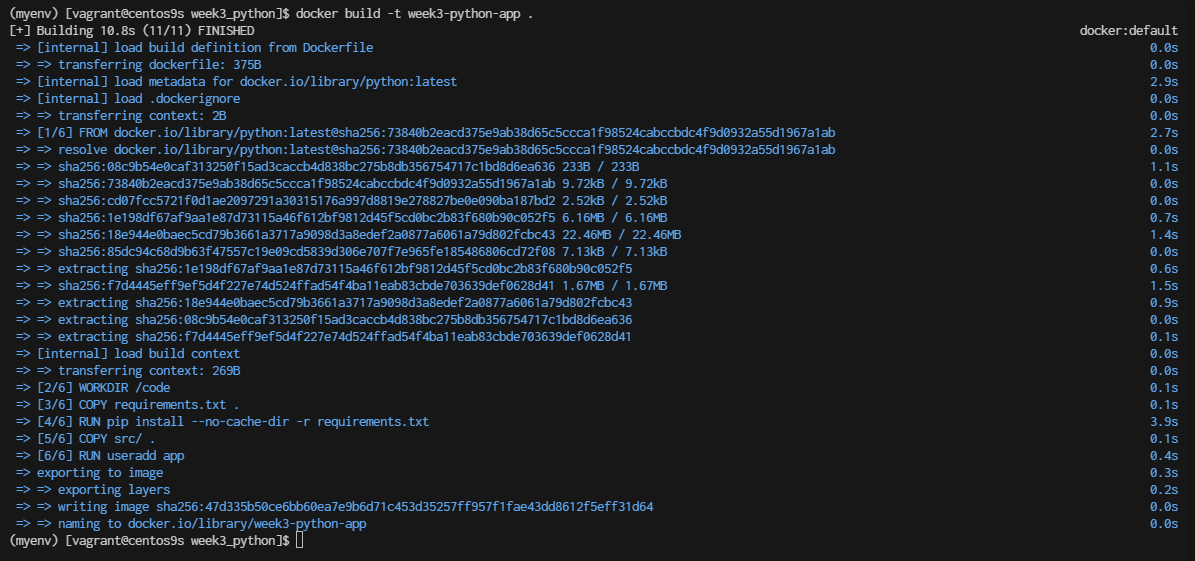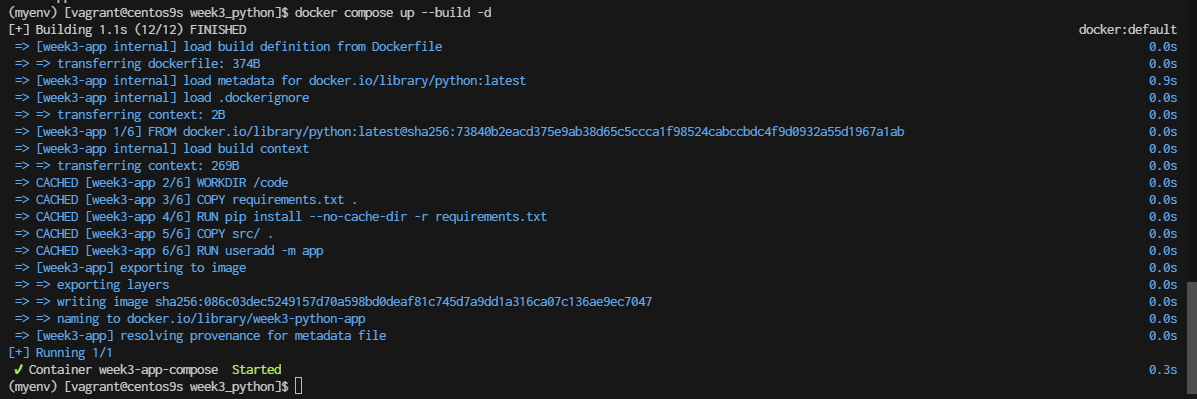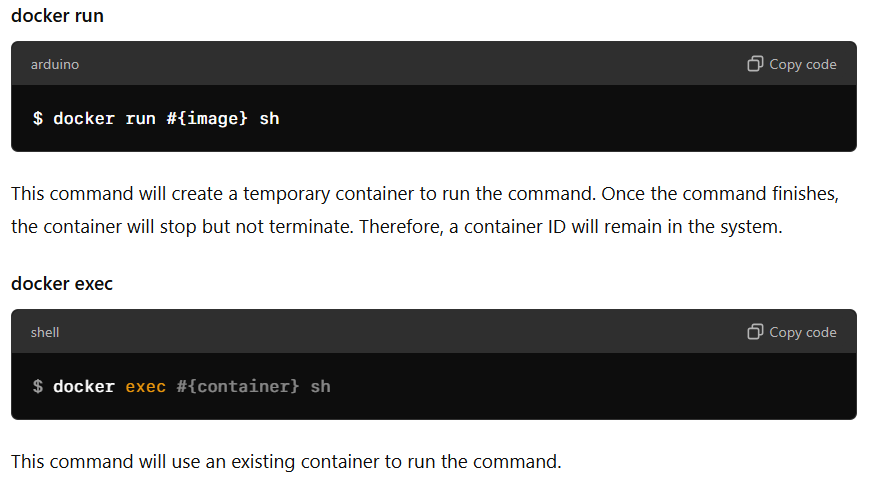python project

Common instructions Some of the most common instructions in a Dockerfile include:
FROM <image>- this specifies the base image that the build will extend.WORKDIR <path>- this instruction specifies the "working directory" or the path in the image where files will be copied and commands will be executed.COPY <host-path> <image-path>- this instruction tells the builder to copy files from the host and put them into the container image.RUN <command>- this instruction tells the builder to run the specified command.ENV <name> <value>- this instruction sets an environment variable that a running container will use.EXPOSE <port-number>- this instruction sets configuration on the image that indicates a port the image would like to expose.USER <user-or-uid>- this instruction sets the default user for all subsequent instructions.CMD ["<command>", "<arg1>"]- this instruction sets the default command a container using this image will run.
vagrant ssh to vim
vagrant ssh
check install python, pip
python --version
sudo dnf install python-pip
sudo dnf install tree
Create project
$ cd
$ mkdir week3_python
$ cd week3_python
$ mkdir src
$ python -m venv myenv
$ source myenv/bin/activate
(myenv) $ pip install flask
(myenv) $ pip freeze >> requirements.txt
(myenv) $ cat requirements.txt
- Create main.py
cat <<EOF | tee src/main.py
from flask import Flask
server = Flask(__name__)
@server.route("/")
def index():
return "Hello World!"
if __name__ == "__main__":
server.run(host='0.0.0.0')
EOF
- Test Application
(myenv) $ python src/main.py
Result:
* Serving Flask app 'main'
* Debug mode: off
WARNING: This is a development server. Do not use it in a production deployment. Use a production WSGI server instead.
* Running on all addresses (0.0.0.0)
* Running on http://127.0.0.1:5000
* Running on http://10.0.2.15:5000
Press CTRL+C to quit
Exit project by CTRL+C
- Exit from python development
(myenv) $ deactivate
- Create Dockerfile with python image https://hub.docker.com/_/python
cat <<EOF | tee Dockerfile
FROM python
WORKDIR /code
COPY requirements.txt .
RUN pip install --no-cache-dir -r requirements.txt
# Copy in the source code
COPY src/ .
EXPOSE 5000
# Setup an app user so the container doesn't run as the root user
RUN useradd -m app
USER app
CMD ["python", "main.py"]
EOF
- Project Structure
$ tree -L 2 .
.
├── Dockerfile
├── myenv
│ ├── bin
│ ├── include
│ ├── lib
│ ├── lib64 -> lib
│ └── pyvenv.cfg
├── requirements.txt
└── src
└── main.py
- Create Image
docker build -t week3-python-app .

- Check image
$ docker images
$ docker run -it week3-python-app bash
app@12ec39dcd0fc:/code$ ls
main.py requirements.txt
- Run docker container
$ docker run -d -p 5000:5000 --name week3-app week3-python-app
f9bb95ba424167586ad36d54a8b7a9bfc643e6515efb8328d915c84584914c74
$ ss -tulpn | grep 5000
tcp LISTEN 0 4096 0.0.0.0:5000 0.0.0.0:*
- monitor log
$ docker logs week3-app
Result:
* Serving Flask app 'main'
* Debug mode: off
WARNING: This is a development server. Do not use it in a production deployment. Use a production WSGI server instead.
* Running on all addresses (0.0.0.0)
* Running on http://127.0.0.1:5000
* Running on http://172.17.0.2:5000
Press CTRL+C to quit
- stop container
$ docker container stop wee3-app
$ docker rm week3-app
- Create Docker compose
cat <<EOF | tee docker-compose.yml
services:
week3-app:
container_name: week3-app-compose
image: myreponame/week3-python-app:latest
ports:
- "5000:5000"
build:
context: .
dockerfile: Dockerfile
EOF
- Verify Build and Run:
Make sure the Dockerfile builds successfully by running:
docker compose up --build -d

- Check Logs: with service name. if container stops
$ docker compose logs week3-app

- list docker compose
$ docker compose ps

- Delete images
$ docker rmi week3-python-app:latest
Compare Run and Exec

- Stop Docker compose before process
$ docker compose down
Run another python App
cat <<EOF | tee src/main2.py
from flask import Flask, request, jsonify
app = Flask(__name__)
@app.route("/greet", methods=["GET"])
def greet():
return "Hello! Welcome to the API."
@app.route("/echo", methods=["POST"])
def echo():
data = request.get_json()
return jsonify(data)
@app.route("/hello/<name>", methods=["GET"])
def hello(name):
return f"Hello, {name}!"
if __name__ == "__main__":
app.run(host='0.0.0.0', port=5000)
EOF
- enable firewall port 5000
sudo firewall-cmd --permanent --add-port=5000/tcp
sudo firewall-cmd --reload
$ python src/main2.py
1 Test
curl http://192.168.33.10:5000/greet
Hello! Welcome to the API.
2 Test
curl -X POST http://192.168.33.10:5000/echo -H "Content-Type: application/json" -d '{"key": "1234"}'